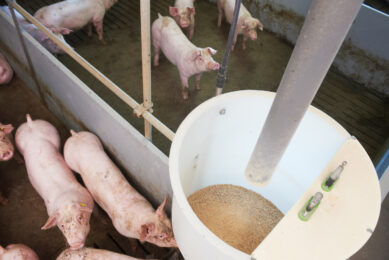Nebraska Swine Report: DDGS in pig diets
The 2009 issue of the Nebraska Swine Report has dedicated a lot of space to nutrition issues, predominantly addressing the latest research on Distillers Dried Grains with Solubles (DDGS).
In the report, DDGS are included in several types of pigs’ diets and several tests were carried out.
Effect of DDGS when also fed in nursery
In one trial, the effect of corn DDGS on growth performance and carcass characteristics of growing-finishing gilts were tested, while being exposed to DDGS when still being in nursery.
On the basis of this trial, researcher Thomas E. Burkey and others, concluded that “the inclusion of high concentrations of DDGS (30%) in both the nursery and the growing-finishing periods may result in negative effects on growth performance and carcass characteristics”. They added that feeding high concentrations during the growing-finishing phase only “may not negatively affect growth performance”.
Varying concentrations
A second trial focused on the feeding value of diets for growing-finishing pigs with variable concentrations of DDGS. Researchers Roman Moreno and others concluded that growth performance of growing-finishing pigs was maintained as DDGS inclusion increased from 0 to 15%.
They added that “this result may indicate that DDGS can provide lysine and other nutrients in adquate concentrations to maximise growth performance in growing-finishing pigs from the the University of Nebraska herd.”
DDGS and Paylean on herd performance
A third trial focused on the question what could be the effects of DDGS and Paylean supplementation on the growth performance of growing-finishing pigs. Researcher Roman Moreno and others concluded that “growth performance of growing-finishing pigs was not affected by increasing dietary DDGS (0-40%) or supplementing ractopamine.” This also counted for barrows.
Further nutrition trials focused on:
• The economy of adding fibrous feedstuffs to sow gestation diets;
• Nutrition during gilt development and genetic line affect reproductive rate through parity 1;
• In vivo and in vitro expression of zinc transporter (Znt) 1 mRNA.
In addition, several health-related and genetics-related topics were discussed. For a pdf of the trial papers, click here.
Related website:
• University of Nebraska-Lincoln











